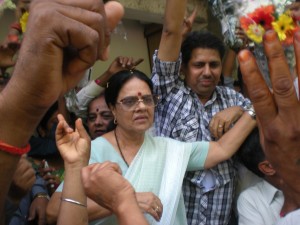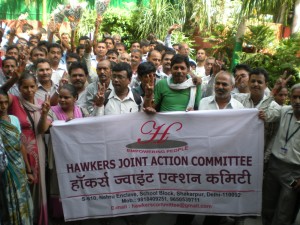Hawkers thanking Ms. Girija Vyas, the Minister for Housing and Urban Poverty Alleviation, Govt. of India for enacting central law to regulate and protect street vendors.
Month: September 2013
Street Vendors (Protection of Livelihood and Regulation of Street Vending) Bill, 2012 passed by Lok Sabha
http://pib.gov.in/newsite/
The Lok Sabha today passed the Street Vendors (Protection of Livelihood and Regulation of Street Vending) Bill, 2012 . The Bill provides for protection of livelihoods rights, social security of street vendors, regulation of urban street vending in the country and for matters connected therewith or incidental thereto.
Moving the Bill for consideration and Passing in the house today, Dr. Girija Vyas, Minister of Housing and Urban Poverty Alleviation, said “Street vendors constitute an integral part of our urban economy. Street vending is not only a source of self-employment to the poor in cities and towns but also a means to provide ‘affordable’ as well as ‘convenient’ services to a majority of the urban population, especially the common man. Street vendors are often those who are unable to get regular jobs in the remunerative formal sector on account of their low level of education and skills. They try to solve their livelihoods issues through their own meagre financial resources and sweat equity.
Given the pace of urbanization and the opportunities presented through the development of urban areas, the growth of street vendors’ population is likely to have an upward trend. She said “ It is vital that these vendors are enabled to pursue their livelihoods in a congenial and harassment free atmosphere. Inclusive growth strategy adopted by the 11th and 12th Five Year Plans calls for a facilitating mechanism for street vending to aid economic growth and inclusion simultaneously.”
Main features of the Street Vendors (Protection of Livelihood and Regulation of Street Vending) Bill, 2012 are as follows:
Bill to Protect Street Vendors Introduced in Lok Sabha
NEW DELHI: A Bill to protect the rights of urban street vendors- including against harassment by the police and other authorities- as well as to regulate street vending activities was today moved for discussion and passage in the Lok Sabha.
Moving for discussion and passage the Street Vendors (Protection of Livelihood and Regulation of Street Vending) Bill, 2012, in the Lok Sabha, Housing and Urban Poverty Alleviation Minister Girija Vyas said it seeks to protect the rights of urban street vendors from harassment by the police, municipal authorities and others.
The Bill, which has already been cleared by the Standing Committee, is also aimed at regulating street vending activities.
“At present around 2 per cent of the population is involved in street vending activity and this figure is likely to reach 2.5 per cent in a few years,” she said, adding the proposed legislation will allow them to earn their livelihood without fear.
The Bill provides for security and protection of livelihood to all street vendors having a vending certificate to be issued by the Town Vending Committee.
Vyas said police and other authorities cannot remove a street vendor who has the certificate. She said those markets, which have been functional for more than 50 years, will be considered natural markets and vendors located there will be protected. The minister said states and the Centre will have to work together to make the Act a success.
Shailendra Kumar (SP) said street vendors mostly belong to OBC and the minority community and also involves unorganised labour. He said in Mumbai there are around five lakh street vendors yet only around 18,000 of them have been given licenses. He demanded the new law should ensure that vendors are allowed to set up shops in or near main markets.
Shailendra Kumar further said the Bill seeks to reduce the fine on street vendors from Rs 1,000 at present to Rs 250 but it would be good if it is reduced further. He lamented that banks do not provide loans to street vendors and they end up being exploited by money lenders.
He said government should see to it that there is no child labour in street vending business.
Supporting the Bill, Jayaprakash Hegde (Cong) said railway vendors, who have been excluded from the Bill, should be brought under it.
He expressed concern over the unhygienic food served by street vendors and said this needs to be looked into.
Anant Geete ( Shiv Sena) said he supports the Bill which seeks to provide security and protection to the street vendors.
The debate will continue in the Lok Sabha tomorrow.
The National Urban Livelihoods Mission to Support Street Vendors and Homeless
September 4th, 2013
The Cabinet Committee on Economic Affairs has approved the National Urban Livelihoods Mission (NULM) with an allocation of approximately Rs. 6,405 crore.
The Mission of NULM is to reduce poverty and vulnerability of the urban poor households by enabling them to access gainful self-employment and skilled wage employment opportunities, resulting in an appreciable improvement in their livelihoods on a sustainable basis, through building strong grassroots level institutions of the poor. The mission would also aim at providing shelter equipped with essential services to the urban homeless in a phased manner. In addition, the Mission would also address livelihood concerns of the urban street vendors also by facilitating access to suitable spaces, institutional credit, social security and skills to the urban street vendors for accessing emerging market opportunities.
NULM will rest on the foundation of community mobilization and women empowerment. NULM envisages universal mobilisation of urban poor households into thrift and credit-based Self-Help Groups (SHGs) and their federations/collectives. These groups will serve as a” support system for the poor, to meet their financial and social need. Under the Mission, City Livelihood Centres (CLCs) will be established in Mission cities to provide a platform whereby the urban poor can market their services and access information on self-employment, skill training and other benefits.
The Support to Urban Street Vendors (USV) component will cover a socio-economic survey of street vendors, development of pro-vending urban planning and vendors’ markets, credit enablement of vendors, skill development and micro-enterprise development and convergence under various schemes of the Government.
NULM would aim at providing shelter for the urban homeless equipped with essential services. The shelters should be permanent all-weather 24 x 7 shelters for the urban homeless. For every one lakh urban population, provisions will be made for permanent community shelters for a minimum of one hundred persons. Depending upon local conditions each shelter could cater to between 50 and 100 persons.
The NULM will be implemented in two phases: Phase I (2013-2017) and Phase II (2017-2022). In Phase I, NULM will target all cities with a population of one lakh or more and district headquarter towns with a population of less than one lakh as per Census of India 2011. However, other towns may be allowed in exceptional cases on the request of the States. Funding will be shared between the Centre and the States in the ratio of 75:25.

